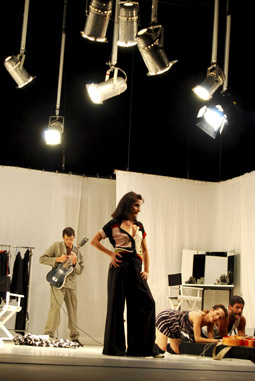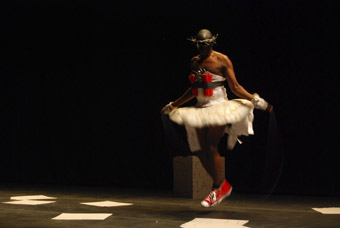a wealth of dancing partners
martin del amo: panorama dance festival, rio de janeiro

(Not) a Love Song
photo Valério Araújo
(Not) a Love Song
WHAT IS IT ABOUT RIO DE JANEIRO THAT MAKES EVERYBODY GO WEAK IN THE KNEES AT THE MERE MENTION OF ITS NAME? IT FEATURES IN THE TOP 10 MOST DANGEROUS CITIES IN THE WORLD ALMOST AS OFTEN AS IN THE MOST BEAUTIFUL. THIS HAS NOT DIMINISHED ITS ALLURE. SO WHAT DOES AN ANNUAL DANCE FESTIVAL IN THIS MOST GLORIFIED OF CITIES LOOK LIKE?
Founded in 1993 by choreographer Lia Rodrigues, Panorama Dance Festival is currently headed by artistic directors Eduardo Bonito and Nayse Lopez. Now in its 18th year, Panorama has developed into one of the most important platforms for contemporary dance in Brazil, if not in all of South America.
(not) a love song
One of the declared aims of the festival is to present international works to local audiences at affordable prices. On offer this year were works by artists from France, Switzerland, Portugal, Uruguay, Japan, French Guiana and South Africa. Among those, (Not) a Love Song by French choreographer Alain Buffard was an undisputed crowd pleaser and it was easy to see why. Billed as a “tragic musical,” it features an eclectic mix of all-time favourites including Kurt Weill’s “Ballad of Sexual Obsession,” James Brown’s “This is a Man’s World” and Public Image Limited’s “This is not a Love Song,” referenced in the piece’s title. The songs are rendered with idiosyncratic verve by the standout cast—Miguel Gutierrez, Vera Montero and Claudia Triozzi—all renowned performance makers who inimitably people the stylish black-and-white stage with all kinds of quirky characters such as ultra glamorous femmes fatales playing air guitar and a movie director whose only direction to his female stars is “hmmm.” There are also ageing divas and a camp personal trainer who speaks at break-neck speed, gradually transforming into a drill sergeant gone mad. The piece’s movement material is inspired by Broadway razzle dazzle routines and cat walk strutting, the self-obsessed posing of the performers becoming increasingly grotesque. They stagger across the stage, losing control, towards the end turning into dog-like creatures. (Not) a Love Song playfully exposes a world enamoured with itself, obsessed with celebrity and self-display.

Influx Controls, Boyzie Cekwana
photo Valério Araújo
Influx Controls, Boyzie Cekwana
influx controls: i wanna be wanna be
Strong partnerships with numerous important arts organizations in Europe, such as Arts Admin in London, the Goethe Institut, Alliance Francaise etc, have enabled Panorama to regularly present works by European artists and companies including innovators like Jerome Bel, La Ribot and Jonathan Burrows. Under the artistic directorship of Bonito and Lopez, there has been a push to present more works from Southern Hemisphere countries, especially South America and Africa south of the Equator. It was no surprise then that the involvement of South African choreographer and dancer Boyzie Cekwana in Panorama 2009 was two-fold. He not only mentored young dancers as part of the festival’s residency program, coLABoratorio, but also presented a work, Influx Controls: I Wanna Be Wanna Be. It’s a powerful evocation of the artist’s struggle to negotiate his identity, both cultural and sexual, in South Africa’s post-Apartheid era. At the beginning of the piece, we see Soweto-born Cekwana clad in black pants and a white corset with what looks like a belt of explosives strapped to his chest. His face is painted black and his lips are bright red. He runs on the spot, his arms executing powerful jabs. It looks as if he is fighting. But who is the enemy? The past? Others’ perception of him? History itself? By the end of the work, Cekwana has undergone a striking transformation. He is now wearing a metal crown of thorns and a tutu with strips of papers attached, like price tags. He suggestively crawls across the audience, occasionally stopping for a brief lap dance. Is this the celebration of a new-found identity, proudly embraced, in full awareness of its flaws…? .
brazilian works
Besides presenting new international productions, Panorama also aims to showcase and promote Brazilian work with a focus on artists and companies outside of Rio. As the fifth largest country in the world, Brazil’s geographic dimensions pose similar difficulties for artists to tour their work nationally as those with which Australian artists are familiar. The scope of the Brazilian work presented at the 2009 Panorama Festival is impressive, to say the least. It ranges from Company Quasar’s electrifying athleticism and extraordinary physical comedy skills to Roberto Ramos’ concept-driven movement research, utterly mesmerizing due to the performers’ physical precision and commitment to process.
One of the most intriguing contributions comes from Company Cena 11. In their Embodied Voodoo Game, the concept of the voodoo doll is explored as a potent metaphor for the correlation between dance and video games, the body and new technologies. The roles of manipulator, medium and the manipulated constantly change throughout the piece. Sometimes it’s audience members who manipulate the on-stage action by giving instructions to the performers. At other times it’s the performers who are in control. Using gaming devices such as joysticks and acceleration and motion sensors, they manipulate sound and image projections. Gradually, a sense of danger and violence creeps in, as in the advanced stages of a computer game. Bodies leap through the air and crash to the ground. A female dancer is suspended by her hair extensions. Heavy rocks are balanced on body parts. In the end, the stage is covered with white feathers, electrical fans swirling them up into the air as the performers spin on the spot. It’s an image of arresting beauty that is simultaneously disconcerting. Aestheticized disarray. Game over.
artistic & audience development
Apart from presenting work, Panorama’s major aim is to create opportunities for dance and performance research as well as to raise the profile of contemporary dance in Rio. Throughout the year, audience development initiatives and activities are conducted in order to heighten the awareness for dance. They include free shows for residents of the favelas in the outskirts of Rio and the handing out of booklets in schools. In terms of artistic development, Panorama offers its residency program coLABoratorio.
For a period of several months prior to the festival, emerging artists from Rio and Teresina engage in artistic exchange, mentored by more established artists, both national and international.
Panorama is a massive undertaking made possible through a large number of income sources, predominantly government funding and corporate sponsorship. The festival is also strongly supported by international presenting partners and arts organisations in Rio including the presenting venues and the city’s Choreographic Centre. It’s partly because of these strong partnerships that Panorama’s success has steadily increased over the years. According to artistic director Bonito, the 2009 edition of the festival was the best attended yet.
And from an Australian perspective? Only one Australian company has presented work at Panorama to date, Branch Nebula in 2007. There is hope this might change. Panorama recently added Dancehouse Melbourne to their long list of exchange partners and Bonito and Lopez have become regulars at the Australian Performing Arts Market (APAM) held biennially in Adelaide. It would enrich Australian artists to be able to present work regularly at this diverse and stimulating dance festival.
Alain Buffard, (Not) a Love Song, concept Alain Buffard, cast Miguel Gutierrez, Vera Mantero, Claudia Triozzi, Seb Martel, musical adaptation Vincent Ségal; Boyzie Cekwana, Influx Controls: I Wanna Be Wanna Be, concept and performance Boyzie Cekwana; Quasar, Céu na Boca, choreography Henrique Rodovalho; Roberto Ramos/D.A.M., Continuum, direction and conception Roberto Ramos, performance Catalina Cappeletti, Gustavo Ramos, Roberto Ramos; Cena 11, Embodied Voodoo Game, choreography Alejandro Ahmed and cast, soundtrack and montage coordination Hedra Rockenbach; Panorama Dance Festival 2009, Rio de Janeiro, Nov 5-15, 2009
RealTime issue #96 April-May 2010 pg. 29






